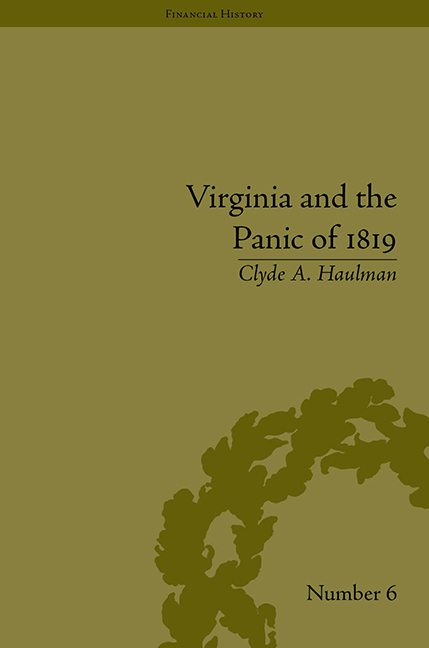Book contents
3 - Banking and Government Finance
Summary
As the Panic of 1819 gripped the nation, the Commonwealth's leading newspaper, the Richmond Enquirer, announced on 21 May 1819, ‘we shall for several months keep open a head in this paper, styled “Political Economy”’. The object was ‘to excite investigation’ because, according to the Enquirer, ‘The times particularly demand information on the subject of political economy. The country is lamentably deficient in important knowledge.’ As the Enquirer editorial suggested, ‘Never did a thicker gloom hang over the monied transactions of this land. The state of the markets, of trade, of the interest of manufactures, the great problem of the banking system, of the precious metals; there is scarce an individual in this country, who does not feel some interest in these questions.’ The announcement concluded, ‘Things are winding up; but perhaps too fast and in too much panic’.
Four days later, the first article under the new banner appeared. ‘A deeper gloom was never spread over the commercial world than is seen at this moment’, wrote the author of the piece, Economicus. First describing conditions in Europe, he then turned to America. ‘Here we find in almost every quarter, an unparallelled embarrassment in the money market’. According to Economicus, the nation's condition could be blamed on the banks. ‘It is a melancholy (nay worse, it is a disgraceful) fact, that this country, blessed beyond any that the world ever shone upon, has been brought to this condition, principally by monied institutions: by their multiplication and mismanagement’. Most important was the mismanagement which had ‘given birth to the wildest spirit of speculation. Speculation has generated banks; and banks have generated a tenfold spirit of speculation’. This spirit had, in turn, affected the ‘moral habits of this nation’, including corrupting ‘our manners’ and undermining our ‘republican principles’.
The Introduction indicated that modern economic theory, particularly monetarist and asymmetric information theory, has focused on the role of financial institutions and their credit mechanisms as the source of major contractions in the real economy. The debt-deflation view of great depressions sees ‘easy money as the great cause of over-borrowing’ i.e., easy money and liberal loans start the process leading to economic downturns.
- Type
- Chapter
- Information
- Virginia and the Panic of 1819The First Great Depression and the Commonwealth, pp. 39 - 56Publisher: Pickering & ChattoFirst published in: 2014

